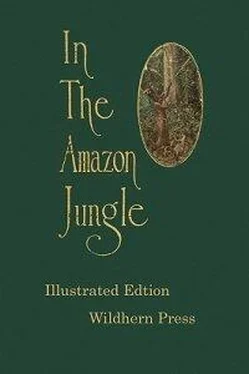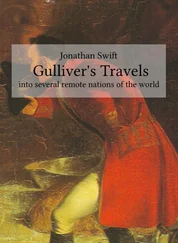Algot Lange - In the Amazon Jungle - Adventures in Remote Parts of the Upper Amazon River, Including a Sojourn Among Cannibal Indians
Здесь есть возможность читать онлайн «Algot Lange - In the Amazon Jungle - Adventures in Remote Parts of the Upper Amazon River, Including a Sojourn Among Cannibal Indians» весь текст электронной книги совершенно бесплатно (целиком полную версию без сокращений). В некоторых случаях можно слушать аудио, скачать через торрент в формате fb2 и присутствует краткое содержание. Жанр: Путешествия и география, Приключения про индейцев, на английском языке. Описание произведения, (предисловие) а так же отзывы посетителей доступны на портале библиотеки ЛибКат.
- Название:In the Amazon Jungle : Adventures in Remote Parts of the Upper Amazon River, Including a Sojourn Among Cannibal Indians
- Автор:
- Жанр:
- Год:неизвестен
- ISBN:нет данных
- Рейтинг книги:3 / 5. Голосов: 1
-
Избранное:Добавить в избранное
- Отзывы:
-
Ваша оценка:
- 60
- 1
- 2
- 3
- 4
- 5
In the Amazon Jungle : Adventures in Remote Parts of the Upper Amazon River, Including a Sojourn Among Cannibal Indians: краткое содержание, описание и аннотация
Предлагаем к чтению аннотацию, описание, краткое содержание или предисловие (зависит от того, что написал сам автор книги «In the Amazon Jungle : Adventures in Remote Parts of the Upper Amazon River, Including a Sojourn Among Cannibal Indians»). Если вы не нашли необходимую информацию о книге — напишите в комментариях, мы постараемся отыскать её.
In the Amazon Jungle : Adventures in Remote Parts of the Upper Amazon River, Including a Sojourn Among Cannibal Indians — читать онлайн бесплатно полную книгу (весь текст) целиком
Ниже представлен текст книги, разбитый по страницам. Система сохранения места последней прочитанной страницы, позволяет с удобством читать онлайн бесплатно книгу «In the Amazon Jungle : Adventures in Remote Parts of the Upper Amazon River, Including a Sojourn Among Cannibal Indians», без необходимости каждый раз заново искать на чём Вы остановились. Поставьте закладку, и сможете в любой момент перейти на страницу, на которой закончили чтение.
Интервал:
Закладка:
The jungle no longer seemed beautiful or wonderful to me, but horrible—a place of terror and death.
In my drug-dazed sleep on that back-track, I started up in my hammock, bathed in a sweat of fear from a dream; I saw myself and my companions engulfed in a sea of poisonous green, caught by living creepers that dragged us down and held us in a deadly octopus embrace. The forest was something from which I fled; it was hideous, a trap, with its impenetrable wall of vegetation, its dark shadows, and moist, treacherous ground.
I longed for the open; struggled for it, as the swimmer struggles up for air to escape from the insidious sucking of the undertow.
Starving, weak from fever, oppressed by the thought of death, but lashed on by stimulants and the tenacity of life, I headed with my two comrades out of the world of the unknown, toward the world of men—to Life .
CHAPTER VIII.
WHAT HAPPENED IN THE FOREST
On the second day of the return trip, we had a remarkable experience. Probably not more than two hundred yards from the tambo where we had spent the night, we heard the noise, as we thought, of a tapir, but nothing could surpass our astonishment when we saw a human being. Who could it be that dared alone to disturb the solitude of the virgin forest, and who went along in these dreary woods humming a melody?
It was a young Indian who approached us cautiously when Jerome spoke in a tongue I did not understand, and evidently told him that we were friends on the way back to our homes by the river. He was an unusually fine specimen of a savage, well built, beautifully proportioned, and with a flawless skin like polished bronze. His clothing was limited to a bark girdle, and a feather head-dress not unlike that worn by some North American Indians.
He was armed with bow and arrows and a blow-gun; and he had a small rubber pouch filled with a brownish substance, the remarkable wourahli poison. He explained to Jerome that his tribe lived in their maloca , or tribal house, about 24 hours' march from this place, and that he had been chasing a tapir all day, but had lost its track, and was now returning to his home. He pointed in a north-western direction with his blow-gun, signifying thereby the general route he was going to follow in order to reach his destination. We sat down on the ground and looked at each other for quite a while, and thus I had my first chance of studying a blow-gun and the poisoned arrows, outside a museum, and in a place where it was part of a man's life. At the time I did not know that I was to have a little later a more thorough opportunity of examining this weapon. I asked the Indian, Jerome acting as interpreter, to demonstrate the use of the gun, to which he consented with a grin. We soon heard the chattering of monkeys in the tree-tops, and deftly inserting one of the thin poisoned arrows in the ten-foot tube he pointed the weapon at a swiftly moving body among the branches, and filling his lungs with air, let go. With a slight noise, hardly perceptible, the arrow flew out and pierced the left thigh of a little monkey. Quick as lightning he inserted another arrow and caught one of the other monkeys as it was taking a tremendous leap through the air to a lower branch. The arrow struck this one in the shoulder, but it was a glancing shot and the shaft dropped to the ground. In the meantime the Indian ran after the first monkey and carried it up to me. It seemed fast asleep, suffering no agony whatever; and after five or six minutes its heart ceased beating. The other monkey landed on the branch it was aiming for in its leap, but after a short while it seemed uneasy and sniffed at everything. Finally, its hold on the branch relaxed, it dropped to the ground and was dead in a few minutes. It was a marvellous thing to behold these animals wounded but slightly, the last one only scratched, and yet dying after a few minutes as if they were falling asleep. It was then explained to me that the meat was still good to eat and that the presence of poison would not affect the consumer's stomach in the least; in fact, most of the game these Indians get is procured in this manner. I was lucky enough to secure a snap-shot of this man in the act of using his blow-gun. It proved to be the last photograph I took in the Brazilian jungles. Accidents and sickness subsequently set in, and the fight for life became too hard and all-absorbing even to think of photographing. He left us after an hour's conversation, and we resumed our journey homewards.
We had a slight advantage in retracing our former path. Although the reedy undergrowth had already choked it, we were travelling over ground that we knew, and it was also no longer necessary to delay for the building of tambos ; we used the old ones again.
Jerome had complained for some time of a numbness in his fingers and toes, and also of an increasing weakness of the heart that made every step a torment. The Chief and I tried our best to cheer him up, although I felt certain that the brave fellow himself knew what dreadful disease had laid its spell upon him. However, we kept on walking without any words that might tend to lower our already depressed spirits.
But our march was no longer the animated travel it had been on the way out; we talked like automatons rather than like human, thinking beings. Suffering, hunger, and drugs had dulled our senses. Only the will to escape somehow, the instinct of self-preservation, was fully awake in us. A sweep of the machete to cut a barrier bushrope or climber, one foot placed before the other, meant that much nearer to home and safety. Such was now the simple operation of our stupefied and tired brains, brains that could not hold one complex thought to its end; too tired—tired!
At nightfall we stumbled into our old tambo No. 7. There was no thought of securing food, no possibility of getting any; we had been too tired to even attempt to shoot game during the day. The two monkeys which the Indian had killed with his blow-gun were the only food we had and these we now broiled over the camp-fire and devoured fiercely. After this meal, none too good, we slung our hammocks with difficulty and dropped in. Jerome's numbness increased during the night. We were up and on the trail again with the dawn.
In the afternoon we descended a hill to find ourselves confronted by a swamp of unusual extent. The Chief was in the lead as we crossed the swamp and we lost him from our sight for a few minutes. While crossing this wide, slimy-bottomed place, I noticed a peculiar movement in the water near me, and soon made out the slender bodies of swamp-snakes as they whipped past among the branches and reeds. These snakes are called by the Brazilians jararacas and are very poisonous; however, I had no fear for myself as I wore heavy buffalo-hide boots, but the men walked barefooted, and were in great danger. I cried out a warning to Jerome, who took care to thrash about him. We supposed that we had passed this snake-hole without mishap when we rejoined the Chief on "terra firma." He was leaning over, as we approached him, and he turned a face to us that was stricken with fear. He pointed to the instep of his right foot and there on the skin were two tiny spots, marked by the fangs of the snake. Without a word we sank to the ground beside him in despair. The unfortunate man, with dilated eyes fixed upon the ground, crouched waiting for the coming of the pain that would indicate that the poison was working its deadly course, and that the end was near if something was not done immediately.
Losing no more time, I cried to Jerome to pour out some gunpowder while I sucked the wound. While doing this I fumbled in the spacious pockets of my khaki hunting-coat and secured the bistoury with which I made a deep incision in the flesh over the wound, causing the blood to flow freely. In the meantime, Jerome had filled a measure with black powder and this was now emptied into the bleeding wound and a burning match applied at once. The object of this was to cauterise the wound, a method that has been used with success in the outskirts of the world where poisonous reptiles abound and where proper antidotes cannot be had.
Читать дальшеИнтервал:
Закладка:
Похожие книги на «In the Amazon Jungle : Adventures in Remote Parts of the Upper Amazon River, Including a Sojourn Among Cannibal Indians»
Представляем Вашему вниманию похожие книги на «In the Amazon Jungle : Adventures in Remote Parts of the Upper Amazon River, Including a Sojourn Among Cannibal Indians» списком для выбора. Мы отобрали схожую по названию и смыслу литературу в надежде предоставить читателям больше вариантов отыскать новые, интересные, ещё непрочитанные произведения.
Обсуждение, отзывы о книге «In the Amazon Jungle : Adventures in Remote Parts of the Upper Amazon River, Including a Sojourn Among Cannibal Indians» и просто собственные мнения читателей. Оставьте ваши комментарии, напишите, что Вы думаете о произведении, его смысле или главных героях. Укажите что конкретно понравилось, а что нет, и почему Вы так считаете.












